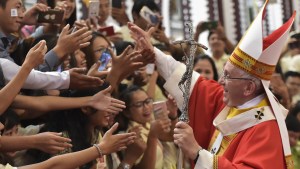Being holier doesn’t make life easier, observed Pope Francis on April 14. And in fact, holy women and men have their own specific problems to address, as well as often being “the objects of opposition.” But there is a key difference, the Holy Father says: “Their strength is prayer. They always draw from the inexhaustible ‘well’ of Mother Church.”
The saints, who often count for little in the eyes of the world, are in reality the ones who sustain it, not with the weapons of money and power, of the communications media – and so forth – but with the weapon of prayer.
Pope Francis urged that we examine our prayer lives to see if we are drawing from this endless strength:
The question that we Christians need to ask ourselves is:
Do I pray? Do we pray? How do I pray? Like parrots or do I pray with my heart? How do I pray? Do I pray, certain that I am in the Church and that I pray with the Church? Or do I pray a bit according to my ideas and then make my ideas become prayer? This is a pagan prayer, not Christian.
I repeat: We can conclude that the lamp of faith will always be lit on earth as long as there is the oil of prayer.
Church as teacher of prayer
These reflections were part of Pope Francis’ ongoing catechesis series on prayer, with today’s meditation being dedicated to the Church as “teacher of prayer.”
Speaking about how the “garment of faith” must grow with us, the pope explained that we “grow in faith inasmuch as we learn to pray.
“After certain passages in life, we become aware that without faith we could not have made it and that our strength was prayer – not only personal prayer, but also that of our brothers and sisters, and of the community that accompanied and supported us, of the people who know us, of the people we ask to pray for us,” he said.
Pope Francis spoke about how all through history, prayer has been a motor. He noted the role of contemplative communities, dedicated primarily to prayer.
They are cells that are vital not only for the ecclesial fabric, but that of society itself. Let us think, for example, of the role that monasticism played in the birth and growth of European civilization, and other cultures as well. Praying and working in community keeps the world going. It is a motor!
Devil’s work
But Pope Francis warned that there is a force trying to eliminate prayer.
“When the Enemy, the Evil One, wants to combat the Church, he does so first by trying to drain her fonts, hindering them from praying,” he said.
In this context, the pope reflected on how important it is to make decisions in the Church based on prayer. He asserted that changes made in the Church without prayer are not “made by the Church.”
For example, we see this in certain groups who agree about moving ecclesial reform forward, changes in the life of the Church and all the organizations, it is the media that informs everyone… But prayer is not evident, there is no prayer. We need to change this; we need to make this decision that is a bit tough… But the proposal is interesting. It is interesting!
Only with discussion, only through the media. But where is prayer? And prayer is what opens the door to the Holy Spirit, who inspires progress.
Changes in the Church without prayer are not changes made by the Church. They are changes made by groups. And when the Enemy – as I said – wants to combat the Church, he does it first of all by draining her fonts, inhibiting prayer and making these other proposals.
If prayer ceases, for a little while it seems that everything can go ahead like always – by inertia, no? – but after a short time, the Church becomes aware that it has become like an empty shell, that it has lost its bearings, that it no longer possesses its source of warmth and love.
Will there be faith?
The Holy Father brought up the question from Luke’s Gospel posed by Jesus: a “dramatic question that always makes us reflect: ‘When the Son of Man comes, will he find faith on earth?’ (Lk 18:8)”
“Or will he,” the pope asked, “find only organizations, like groups of entrepreneurs of the faith, everything organized well, who do charitable works, many things, or will he find faith?”
The question comes at the end of a parable on persevering in prayer, the pope noted. “Therefore, we can conclude that the lamp of faith will always be lit on earth as long as there is the oil of prayer,” he said.
And this is the Church’s essential task: to pray and to teach how to pray.
To transmit the lamp of faith and the oil of prayer from generation to generation. […] Without faith everything collapses; and without prayer faith is extinguished. Faith and prayer together. There is no other alternative.
For this reason, the Church, as the house and school of communion, is the house and school of faith and prayer.

